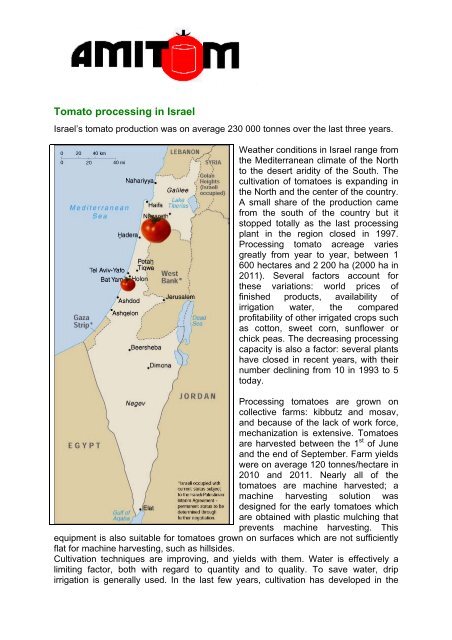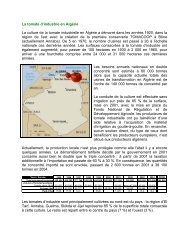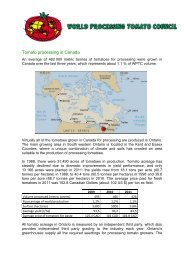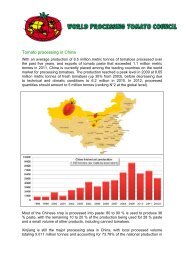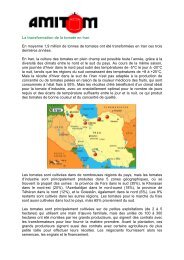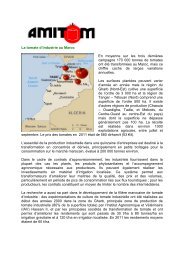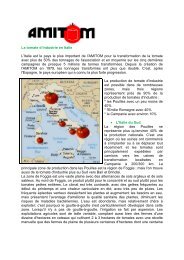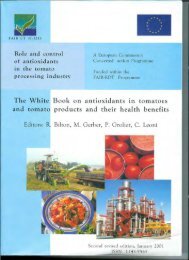Tomato processing in Israel
Tomato processing in Israel
Tomato processing in Israel
Create successful ePaper yourself
Turn your PDF publications into a flip-book with our unique Google optimized e-Paper software.
<strong>Tomato</strong> <strong>process<strong>in</strong>g</strong> <strong>in</strong> <strong>Israel</strong><br />
<strong>Israel</strong>’s tomato production was on average 230 000 tonnes over the last three years.<br />
Weather conditions <strong>in</strong> <strong>Israel</strong> range from<br />
the Mediterranean climate of the North<br />
to the desert aridity of the South. The<br />
cultivation of tomatoes is expand<strong>in</strong>g <strong>in</strong><br />
the North and the center of the country.<br />
A small share of the production came<br />
from the south of the country but it<br />
stopped totally as the last <strong>process<strong>in</strong>g</strong><br />
plant <strong>in</strong> the region closed <strong>in</strong> 1997.<br />
Process<strong>in</strong>g tomato acreage varies<br />
greatly from year to year, between 1<br />
600 hectares and 2 200 ha (2000 ha <strong>in</strong><br />
2011). Several factors account for<br />
these variations: world prices of<br />
f<strong>in</strong>ished products, availability of<br />
irrigation water, the compared<br />
profitability of other irrigated crops such<br />
as cotton, sweet corn, sunflower or<br />
chick peas. The decreas<strong>in</strong>g <strong>process<strong>in</strong>g</strong><br />
capacity is also a factor: several plants<br />
have closed <strong>in</strong> recent years, with their<br />
number decl<strong>in</strong><strong>in</strong>g from 10 <strong>in</strong> 1993 to 5<br />
today.<br />
Process<strong>in</strong>g tomatoes are grown on<br />
collective farms: kibbutz and mosav,<br />
and because of the lack of work force,<br />
mechanization is extensive. <strong>Tomato</strong>es<br />
are harvested between the 1 st of June<br />
and the end of September. Farm yields<br />
were on average 120 tonnes/hectare <strong>in</strong><br />
2010 and 2011. Nearly all of the<br />
tomatoes are mach<strong>in</strong>e harvested; a<br />
mach<strong>in</strong>e harvest<strong>in</strong>g solution was<br />
designed for the early tomatoes which<br />
are obta<strong>in</strong>ed with plastic mulch<strong>in</strong>g that<br />
prevents mach<strong>in</strong>e harvest<strong>in</strong>g. This<br />
equipment is also suitable for tomatoes grown on surfaces which are not sufficiently<br />
flat for mach<strong>in</strong>e harvest<strong>in</strong>g, such as hillsides.<br />
Cultivation techniques are improv<strong>in</strong>g, and yields with them. Water is effectively a<br />
limit<strong>in</strong>g factor, both with regard to quantity and to quality. To save water, drip<br />
irrigation is generally used. In the last few years, cultivation has developed <strong>in</strong> the
general region, us<strong>in</strong>g underground water. There are reserves of brackish water<br />
dat<strong>in</strong>g from the last glacial period which constitute major water reserves that are<br />
be<strong>in</strong>g <strong>in</strong>creas<strong>in</strong>gly used. Farmers are allocated quotas for irrigation.<br />
The price of tomatoes for <strong>process<strong>in</strong>g</strong> had rema<strong>in</strong>ed stable from 1993 to 1999, at<br />
USD/t 64.5 for 4.8° brix with premium for high dry matter content; then dropped <strong>in</strong><br />
2000 down to 62.5 US $ for 4.9 – 5.0° brix tomatoes and aga<strong>in</strong> from 2001 to 2003 at<br />
60 US $ / MT. In 2010 and 2011, processors paid 88.5 US $ per MT. ex field.<br />
<strong>Israel</strong>i processors manufacture a large range of tomato products but are try<strong>in</strong>g more<br />
and more to produce specialties to position themselves on the <strong>in</strong>ternational markets.<br />
In 2005, they processed 28 000 MT. of paste, 8 000 MT. of diced tomatoes, 2<br />
600 MT. of dehydrated tomatoes and 1 000 MT. of whole peeled tomatoes.<br />
Weather hazards, water shortages and high production costs make it difficult for the<br />
<strong>Israel</strong>i <strong>in</strong>dustry to rema<strong>in</strong> competitive compared to other countries <strong>in</strong> the<br />
Mediterranean Bas<strong>in</strong> such as Turkey.<br />
2009 2010 2011<br />
Volume processed (metric tonnes) 238 243 218<br />
Pourcentage of world production 0,6% 0,7% 0,6%<br />
Surface (hectares) 2125 2000<br />
Average yield (t/ha) 120 120<br />
Average price of tomatoes for paste 88,5 USD 88,5 USD


